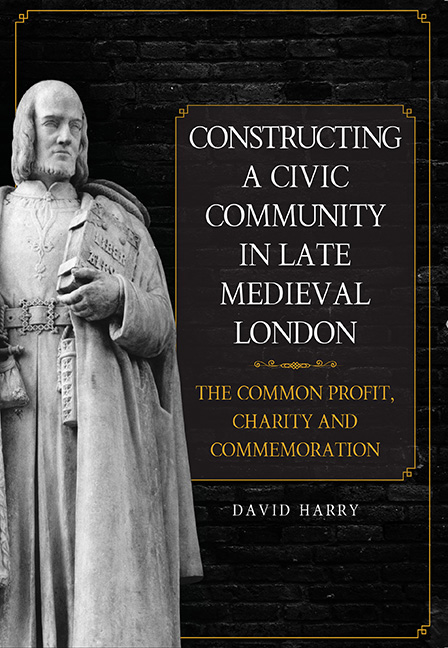Book contents
- Frontmatter
- Dedication
- Contents
- Acknowledgements
- Abbreviations
- Introduction: Common profit and charity in late medieval London
- 1 Radical London, 1376–86
- 2 Reconfiguring political authority
- 3 Civic ceremony and staging the limits of authority
- 4 The exemplary dead
- 5 Spiritual authority and the common profit
- 6 Print and the pursuit of the common profit
- Conclusion
- Bibliography
- Index
2 - Reconfiguring political authority
Published online by Cambridge University Press: 04 April 2019
- Frontmatter
- Dedication
- Contents
- Acknowledgements
- Abbreviations
- Introduction: Common profit and charity in late medieval London
- 1 Radical London, 1376–86
- 2 Reconfiguring political authority
- 3 Civic ceremony and staging the limits of authority
- 4 The exemplary dead
- 5 Spiritual authority and the common profit
- 6 Print and the pursuit of the common profit
- Conclusion
- Bibliography
- Index
Summary
The trial of William Hughlot
In the meeting of the court of the common council of London, held on the Feast of St Hilary (13 January) 1387, one William Hughlot, a servant of the king and citizen of London, was asked to make answer for a trespass committed against the city. Hughlot was accused of making his way to the house of John Elyngham, a barber of the parish of St Dunstan in the West, and assaulting him with a knife. The cause of this disturbance is not recorded; however, we are told that Elyngham's wife called upon John Rote, skinner, alderman and former sheriff (1381–82) to intervene. In order to maintain the peace, Rote attempted to break up the quarrel between Hughlot and Elyngham. After notifying Hughlot that he was both an alderman of the city and an officer of the king, Rote was attacked and forced to ‘manfully’ defend himself and disarm the perpetrator. A constable was wounded in the scuffle.
Remanded in custody in Newgate prison, Hughlot evidently did not know when to stop. Still raving, he made specific threats against Rote as well as the mayor, Nicholas Exton, before declaring that the court of the Guildhall of London was the ‘worst and most false court in the whole of England’ for condemning him without trial. Two days later, Hughlot was brought before Exton and representative aldermen in the court of the common council to answer this charge. At the beginning of his trial, a deposition against Hughlot was read explaining the severity of his crime. The mayor and aldermen, it was declared, had a precept, vested in the king's authority, to maintain the peace in their city. In London especially, more so than any other city in England, this was to be maintained judiciously. For London was ‘the capital city and mirror of the whole realm and this same place [sets] an example for the business of government with respect of the cities and other important places in the realm’.
The circumstances of this deposition must be approached with caution. The clerk of the court may simply have been exhibiting the rhetoric of civic pride. In addition, the scribe recording this trial may have exercised a certain creative licence – we cannot say for certain if the trial unfolded in the manner precisely described.
- Type
- Chapter
- Information
- Constructing a Civic Community in Late Medieval LondonThe Common Profit, Charity and Commemoration, pp. 41 - 64Publisher: Boydell & BrewerPrint publication year: 2019



